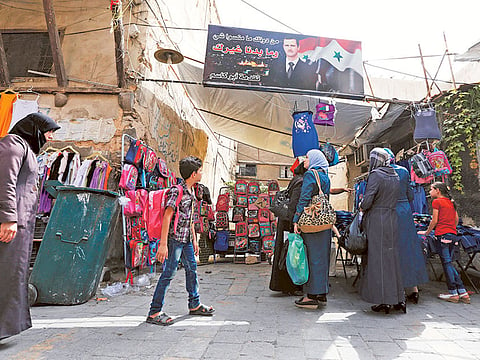Fear overtaking relative calm in Damascus
Damascus residents who were resilient for four years are finally losing hope, leaving the ‘swamp’

Beirut: Even as years of civil war rattled the relative stability of the heavily fortified Syrian capital, she refused to leave her home town. She stayed as rebels seized nearby areas, as job prospects diminished and as friends left for brighter futures in other countries. After a mortar destroyed her 2012 Kia Cerato last year, the 28-year-old newlywed still would not part ways with Damascus.
But last month, she said, something changed. She lost hope.
“It’s hard to leave your home, but I realised there is no future for me in this place,” Ashour said. She and her husband recently decided to move to the Netherlands.
Even as government-controlled Damascus has avoided the violence that is ravaging most of the rest of Syria, a new sense of foreboding is overcoming the city, residents say.
The ancient city’s downtown still bustles with people. Bars still attract swilling patrons. Streets are even safe to walk, at least by Syrian standards these days.
But residents of the capital are watching with concern how the tide of a 4-year-old civil war appears to be turning against their guarantor of security: President Bashar Al Assad. His forces are losing vast territory to Islamist rebels in Syria’s northwest, while the Daesh militant group may now control as much as half the country. Just a few miles beyond central Damascus, rebel-held suburbs are mired in relentless death and destruction.
Meanwhile, the conflict is hobbling the capital’s economy. Power failures and gas shortages have worsened over the past year. As jobs become scarcer, living costs are rising because of a weakening currency and subsidy cuts to water and oil.
Ashour, a university graduate, has been unable to find work in the city’s anemic hotel industry. No one is hiring, she said.
Perhaps more concerning for her is a desire to become a mother at a time of such uncertainty. Although she supports the Al Assad government against the rebellion, she wonders whether the Syrian leader’s forces can sustain a prolonged fight against the Daesh extremists.
“I don’t want to raise my child in a place that could be attacked by people who cut your head and hands off,” Ashour said, speaking by video call.
For now, at least, the nightmare scenario of a Daesh takeover of Damascus seems unlikely. Along with checkpoints and secret police, a heavy military presence keeps central areas of the city and some suburbs firmly under Al Assad’s control.
Occasional bombings and rebel artillery barrages strike Damascus, but the capital’s historic Old City still seems lively. Shoppers throng its souks while worshipers pray at the iconic Umayyad Mosque, Islam’s fourth-holiest place.
In upscale neighborhoods, nightclubs fill with dancing 20-somethings. Even amid the distant thuds of artillery strikes, the rich still flaunt their wealth at lavish weddings.
The glimmers of normalcy starkly contrast with the battles that rage just beyond frontline neighborhoods. In the nearby rebel-held city of Douma, scores of civilians die daily because of indiscriminate bombings by government warplanes.
“It’s this ruthless brutality that the regime has used to keep Damascus in its grip,” said Khaled Yacoub Oweis, a Syria expert at the German Institute for International and Security Affairs, a research institution based in Berlin.
The civil war has killed 250,000 people and uprooted millions since it started in 2011. Thousands of displaced Syrians from other areas have relocated to the safer confines of Al Assad-held Damascus, a city that had a pre-war population of 1.7 million.
But the city is becoming unaffordable for many residents, including Manar, 47, an employee at a government ministry who moonlights as a taxi driver to make ends meet. Because of price increases over the past year, he said, he can hardly feed his two daughters, ages 3 and 12.
“We’re living at the brink of starvation,” said Manar, who earns less than $250 a month.
Last year, two pounds of tomatoes cost him a few cents. Now it’s approaching a dollar, he said, and meat is more than eight times as expensive. If he could afford it, he would leave Syria. “There is this feeling that the war will never end, and that is a scary feeling,” said Manar, who spoke on the condition that only his first name be used because of safety concerns.
If it persists, such sentiment could translate into a broader crisis of confidence in the Al Assad government, said Aron Lund, an expert on Syria who runs a blog about the conflict for the Carnegie Endowment for International Peace.
“If people don’t think there’s an end to this, that the situation is going to get worse, worse and worse, then why wait any longer? Why not pack your bags now?” he said.
“A loss of hope is a major problem for the regime.”
Samar Abu Shakra’s two sons just packed their bags and left. One of them, 19-year-old Khaled, took a smuggling boat to Greece in August and aspires to study music in the Netherlands. The other is in neighboring Lebanon.
Shakra, 45, spends most of her time at the family home in the Bab Touma area reminiscing about better days, she said. Daily power failures now last as long as 10 hours, and markets rarely sell cheese and yogurt because of a lack of refrigeration, she said.
“It’s hard not to cry every day without my sons, but at least now they have a future. They’re not in Syria,” she said.
Most of Ashour’s friends also have fled the country over the past year, with some making new lives in Dubai and Europe, she said. She and her husband are borrowing money for a planned escape through Lebanon to Turkey and then a trek across Europe.
It’s a perilous journey, she acknowledges. But unlike staying in Damascus, she points out, it will lead to opportunity.
“It’s like we’re stuck in a swamp here,” she said.



